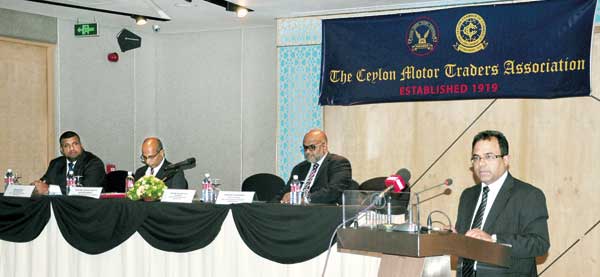Reply To:
Name - Reply Comment

By Chandeepa Wettasinghe
The Colombo Motor Traders Association (CMTA) renewed its call for a national motor industry policy, and is in the process of setting up a long-term policy paper for the use by the government in the midst of a balance of payment crisis and highly congested urban environment.
“It is a very ad-hoc type of policy that takes place. This year we intend to push the development of a policy framework for the automotive trade, so that it can be presented to the policy makers,” CMTA Chairman Gihan Pilapitiya said at the organization’s AGM.
The motor industry has been used as a guinea pig for political and economic experimentation by both the past and current regimes during their budgets; reducing import duties to gain more votes and increasing to gain state revenue.
“The car industry is a place for the government to fall back when money is less,” Pilapitiya said.
With a balance of payment crisis looming, the government may opt to increase duties in the 2016 budget.
“They should not go to both ends. They have to keep it at a stable level.
They shouldn’t reduce it too much for one or two years and suddenly increase it. Okay, the government has to make money, but they should balance it,” Pilapitiya added.
He noted that the current increase in the brand new auto market is artificial due to an abundance of duty-free permits.
These permits are given to the bloated public service, and are transferable.
“They should reduce the duties and reformulate the permit scheme. If you look at the brand new SUV market, over 70 percent is imported through permits. People who are given permits usually can’t afford these, so they sell the permits. It’s a business,” he added.
However, he noted that the overall boom in the auto industry is due to the importation of used vehicles—already benefiting from the depreciation table—without control.
The interim budget had introduced an annual fee of Rs.1.5 million for all car salesmen and dealerships.
Pilapitiya expressed that such a fee is ineffective, and instead recommended that imports be restricted based on accreditations and licenses given to those who invest in infrastructure and customer care and have proper financial backing.
“They have to restrict the importation of vehicles. Even a wayside boutique will have a vehicle for sale, because they invest Rs.3 million, import a vehicle and make Rs.300, 000 profit. No one is bothered about after-sales service, spare-parts availability or proper software for modern vehicles,” he said.
Pilapitiya added that consumers do not manage their demand as well, with cars being bought the sake of buying given the increased income through administered prices cuts and wage hikes, as well as cheap credit schemes offered by banks and finance companies due to lower interest rates prevailing.
Cheap credit and lower fuel prices have resulted in massive congestion in urban areas.
The head of leading local stock brokerage and research house recently recommended a Singapore style limit on car ownership and an urban congestion system.
Pilapitiya offered similar sentiments.
“We can help the government understand markets better. Compare with it with places like Singapore, look at their policies and see whether we can help the country in imports, duties and environmental issues,” he said.
He said that the government should construct car parks outside the Colombo city limits and offer shuttle services in the form of trains or buses to reduce congestion as well.
“Ultimately for the country, this formula of everybody owning a car isn’t going to work. It’s a disadvantage for the vehicle market, but you can’t help it if there’s going to be a national policy,” he added.